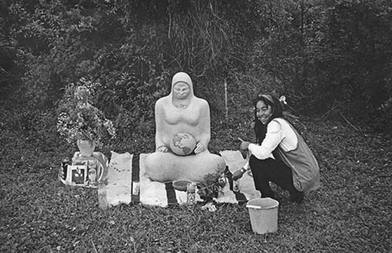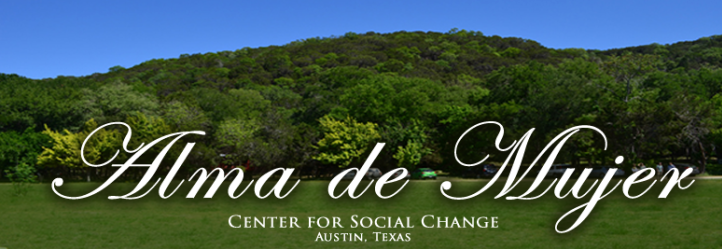Genevieve Vaughan is a feminist philosopher and philanthropist who was a pioneering visionary in establishing various centers across the U.S. that were dedicated to providing spaces in which women could gather. She was especially supportive of the needs of queer women and women of color. In 1988, Genevieve founded Alma de Mujer as a retreat center on the outskirts of Austin. While the name translates to "soul of woman" in Spanish, the retreat center was also named in the memory of Genevieve's friend, Alma Sabatini, who died shortly after Genevieve purchased the property. Upon founding Alma de Mujer, Genevieve named Marsha Gomez, a Founding Mother of IWN, as director of the center. In 1996, Genevieve gifted Alma de Mujer to the Indigenous Women's Network. This is in keeping with Genevieve's visionary promotion of a gift-based economy and her dedication to restoring land to Indigenous communities.

Marsha Gomez
Sculptor, 1951-1998
Marsha Gomez, a woman of Choctaw/Chicana descent, was born in New Orleans in 1951. She grew up in Arkansas where she learned Native American Pottery techniques. After earning a degree in art education, she moved to Austin in 1982 and immediately plunged into community service. Marsha used art to explore her heritage and create social change. Convinced that creativity lies within every person, she was a popular artist-in-residence in Austin schools and taught art to seniors in community centers. She co-founded the Indigenous Women's Network and Director of the Alma de Mujer Center for Social Change.
Marsha created pottery in the style of women artists from Oaxaca and New Mexico. She is best known for her sculpture "Madre del Mundo," an indigenous woman gazing contemplatively at a globe cradled in her lap. The work was commissioned for a Mother's Day peace protest at the Nevada Nuclear Test Site. Federal agents confiscated the statue but later returned it, and Marsha placed it atop a knoll at Alma de Mujer. More commissions followed. She produced a second Madre del Mundo for the Peace Farm in the Texas Panhandle, across the road from the Pantex nuclear weapons plant. She made a third for Casa de Colores, an indigenous resource center and cooperative farm in Brownsville.
Marsha was also a herbalist and enjoyed working in the organic garden at Alma. She developed a great deal of expertise over the years and used the medicines from the garden to create many healing medicines.
Marsha died an untimely death at a young age in 1998 at the hands of her son who had a mental illness and had no idea what he was doing. The entire community mourned the loss of Marsha as did all who knew her.
Marsha's Quotations
"The energy and spirit that go into my work result in a unique expression of respect and reverence for women, the Earth, and indigenous way of life."
"Working with clay as my dear companion for the past fifteen years, I have come closer each year to a deeper union with the Earth and closer to an appreciation of how all the elements in the universe work together. In turn, I myself have become a vessel to the vessels that are created through my heart and hands."
Sculptor, 1951-1998
Marsha Gomez, a woman of Choctaw/Chicana descent, was born in New Orleans in 1951. She grew up in Arkansas where she learned Native American Pottery techniques. After earning a degree in art education, she moved to Austin in 1982 and immediately plunged into community service. Marsha used art to explore her heritage and create social change. Convinced that creativity lies within every person, she was a popular artist-in-residence in Austin schools and taught art to seniors in community centers. She co-founded the Indigenous Women's Network and Director of the Alma de Mujer Center for Social Change.
Marsha created pottery in the style of women artists from Oaxaca and New Mexico. She is best known for her sculpture "Madre del Mundo," an indigenous woman gazing contemplatively at a globe cradled in her lap. The work was commissioned for a Mother's Day peace protest at the Nevada Nuclear Test Site. Federal agents confiscated the statue but later returned it, and Marsha placed it atop a knoll at Alma de Mujer. More commissions followed. She produced a second Madre del Mundo for the Peace Farm in the Texas Panhandle, across the road from the Pantex nuclear weapons plant. She made a third for Casa de Colores, an indigenous resource center and cooperative farm in Brownsville.
Marsha was also a herbalist and enjoyed working in the organic garden at Alma. She developed a great deal of expertise over the years and used the medicines from the garden to create many healing medicines.
Marsha died an untimely death at a young age in 1998 at the hands of her son who had a mental illness and had no idea what he was doing. The entire community mourned the loss of Marsha as did all who knew her.
Marsha's Quotations
"The energy and spirit that go into my work result in a unique expression of respect and reverence for women, the Earth, and indigenous way of life."
"Working with clay as my dear companion for the past fifteen years, I have come closer each year to a deeper union with the Earth and closer to an appreciation of how all the elements in the universe work together. In turn, I myself have become a vessel to the vessels that are created through my heart and hands."

